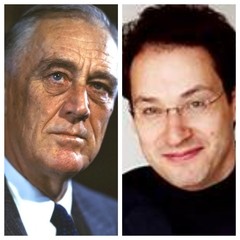|
Back
Varieties on Variations New York
Washington Irving High School
02/19/2022 -
Variations on a Theme of FDR:
Derek Bermel: Pequenas memórias
Anthony Cheung: Bitter Seas
John Harbison: Passage
Wang Lu: Lacuna
Vijay Iyer: Plinth
Ludwig van Beethoven: 33 Variations on a Waltz by Diabelli, Opus 120
Shai Wosner (Pianist) 
F. D. Roosevelt/S. Wosner (© Roosevelt Archives/Marco Borggreve)
“Remember, remember always, that all of us... are descended from immigrants and revolutionists.”
Franklin Delano Roosevelt
February 19, 2022: 80th anniversary of the day when President Franklin Roosevelt signed Executive Order 9066, which led to the forced removal and mass incarceration of about 120,000 Japanese Americans into 10 incarceration camps.
As Homer knew some 3,000 years ago, all heroes, not just Achilles, have their Achilles heel. Franklin Delano Roosevelt was easily the most Presidential politician in American’s 20th Century. But he interned all those with yellow skins, and sent back to Germany a ship with 900 Jews, half of whom would be murdered.
Shai Wosner, though, living here for half of his very productive life, has understood the perils of being an immigrant these past few years. And discovering FDR’s 1938 quote (to the Daughters of the American Revolution), nobly commissioned five composers, several immigrants themselves, to write short works. Each one dedicated to other immigrants.
And as one of the most interesting young pianists on the concert circuit today, he obviously played these five premieres with élan, with spirit and with a fabulous technique.
It was no surprise that the works varied enormously in style and (to this listener) effect. I was not particularly entranced with Anthony Cheung’s Bitter Seas. In the program notes, he created a three‑way jeu de mots, showing “Amer” to be “bitter” in French and a mer, to the sea. The piano piece was complex, difficult at first hearing with a solipsistic inscrutability.
Wang Lu’s Lacuna was dedicated to the late I.M.Pei, “exploring abstraction and tradition”. The title, though, was correct. A gap between the notes and the ears of this listener.
Three other composers well understood that the dedication of Roosevelt’s message need an effort to communication. For two reasons, I thought of Charles Ives, who used songs both secular and patriotic to bring us into that special American cosmos. (Incidentally, he also had much private communication with FDR.)
John Harbison’s Passage has been a mighty exponent of popular music, as in his opera The Great Gatsby. Here it wasn’t melody as such, but an Ivesian dialectic of treble against bass, of feelings contrasting each other. It was vivid and visual.

V. Iyer/D. Bermel
The first and last works were even more meaningful. (I know, of course that “meaning” in music is meaningless, but let that pass.)
Derek Bermel started with the first measures of Mozart’s K. 331 Sonata. Or perhaps he didn’t but the notes were the same. Now came a series of transformations, some on the cusp of jazz, some with Beatles riffs. But always he returned to that simple Mozartean leitmotiv, as if to say, “Well, that FDR maxim has far too many nuances. But the essence is eternal.”
The final variation, Plinth by Vijay Ayer, was more than a paean to the Trinidad‑born civil rights leader Stokely Carmichael. Its enigmas were fascinating. Beginning with some quiet thumping on the bass, Mr. Wosner continued with piano gymnastics rivalling Art Tatum, back to the percussive opening. Nice–and Mr. Iyer inshed with an astonishing surprise: an actual chorale. Save for the harmonies, it could have been Bach. And it could also have been a eulogy for Carmichael himself.
A very short intermission, and Shai Wosner returned for that archetypical set of variations by Beethoven for an insipid waltz by Anton Diabelli. Like Shai Wosner, he had asked five prominent composers to offer a single variation. Beethoven probably aimed for one–but he doubtless saw time to write more...and...more...and more. Thirty‑three in all. He must have thought, “Okay, I’ll start with a funny little march...and then an adagio...and why not an excerpt from that clever dandy Mozart...and give a sudden C Major bang.” And after a few lagers at the tavern, a few dozen more.
The problem is that many artists stick with the humor, the mockery, even giving space between the movements, as if to say, “Now here’s something special.”
Mr. Wosner wisely–very wisely–knew that Beethoven in his later years, noted dynamics and rhythms with some detail. And the greatness of this recital was playing it straight.
In other words, each variation showed what Beethoven could do, and that all technically equipped pianists know how show the composer. The words “good taste” would vilify any artist, but in this rare case, Mr. Wosner knew how to tastefully surrender to the composer.
He started nimbly enough with that waltz, and then each variation was so beautifully played that one forgot variation, and saw each segment a world unto itself. The tenth Presto had a clarity of dashing octaves, the 19th, also Presto and the 27th Vivace were both punchy, that Mozart aria was played as straight as possible.
The 31st variation, Largo molto espressivo, was as close as Beethoven–and Mr. Wosner–came to outright romanticism. Still, the sheer beauty was merely a diamond in this whole myriad of jewels.
Yet it was Mr. Wosner’s totality, his attention to each variation, never exaggerated, never out of place. Always with a sensitivity of touch, with a firm control of the notes, and above all, the intelligence to make Beethoven’s Variations not a tour de force but a towering fantasia of feelings.
Harry Rolnick
|